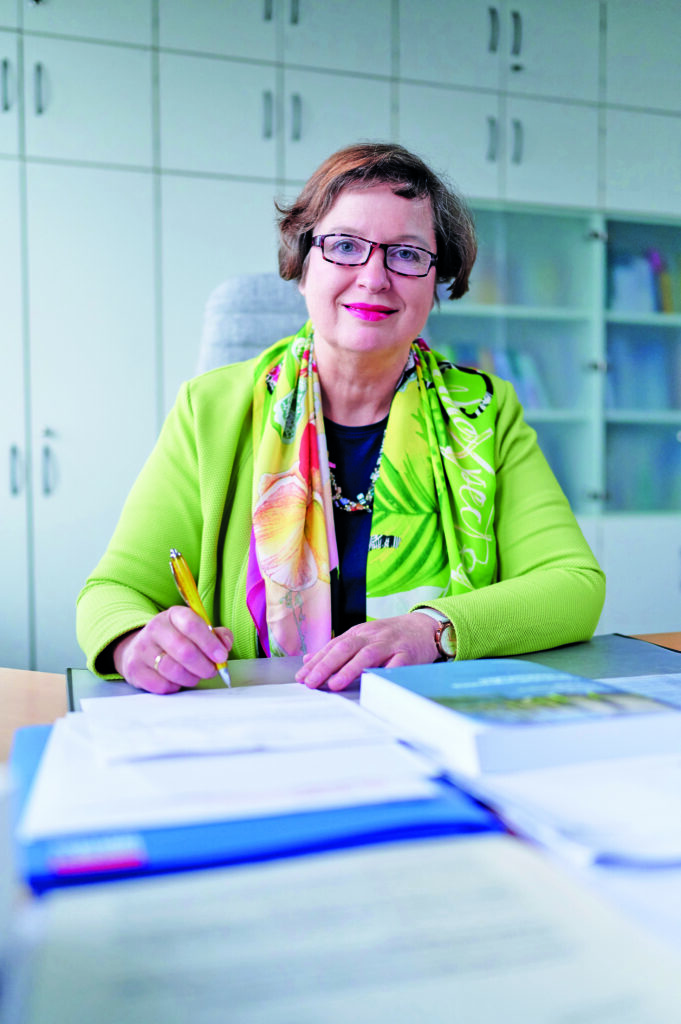Pushing Boundaries
She actually wanted to be a pianist. Now Ute Klammer is setting standards as a scientist. Portrait of a tireless woman. By Katrin Koster
When the sun slowly moves towards the horizon and silence falls on the Duisburg campus, on the 5th floor of the LE building the second part of the work day begins for Prof. Dr. Ute Klammer. This is the time when the researcher digs into meeting records or supervisory board documents and develops research ideas. She’s recently been re-elected as director of the IAQ (Institute for Work, Skills and Training) for another six years. A complex challenge – and it’s one of more than ten, not counting her personal ones.
Ute Klammer has been Professor of Social Policy at the UDE since 2007. She sits on the board of the Society for Social Progress and on the supervisory board of Vallourec Deutschland, a steel pipe manufacturer. In addition, she’s a member of various committees and advisory boards, such as a liaison professor at the Hans Böckler Foundation. And let’s not forget: since May 2021, she’s been Director of the German Institute for Interdisciplinary Social Policy Research (DIFIS), and since January 2022, she’s headed the German Federal Government’s Social Advisory Council – the first woman to hold this position on this policy-advising body, which was established under Chancellor Konrad Adenauer in 1958. That’s truly quite a lot – and most of it on a pro bono basis.
In Berlin, Ute Klammer already had a lot to do before: She was appointed by Chancellor Angela Merkel to the Council for Sustainable Development (2008–2010) and chaired the Commission of Experts for the First Equality Report of the Federal Government (2008–2011). Academic guidance on policymaking is a red thread that runs through many of her offices. ‘Academia has a huge social responsibility and should create benefits; after all, we are funded by taxpayers’ money. For me, it’s a matter of course to build bridges between the political, economic and research spheres,’ as Klammer candidly states.
The focus is on socially relevant issues: at IAQ and in interdisciplinary networks, she explores how to reconcile a career and family life more effectively and what constitutes flexibility and security in the labour market. Klammer understands how poverty among senior citizens arises and is familiar with the prospects for highly qualified people who migrate to Germany. The professor is able to compare European social policy in layman’s terms. This makes her a sought-after interview partner in the media.
Putting care workers on an equal footing with engineers
Currently, a new measuring instrument is being discussed: the Comparable Worth Index, which Klammer developed in collaboration with Dr. Christina Klenner and Sarah Lillemeier.
‘The index shows statistically for the first time that a large share of the gender pay gap is due to different valuations of male and female occupations. According to this analysis, a fair wage for a care worker who has completed training would be roughly equivalent to the pay an engineer receives in Germany today.’ This example alone illustrates how closely her work relates to our everyday lives.
While the sky outside turns the same deep blue as a picture of the Ruhr region inside, the researcher pulls a book out of the expansive cabinet: ‘Equal Opportunities Policy at Universities’ (Gleichstellungspolitik an Hochschulen) – one of about 15 that she authored in collaboration with others. ‘Although there are now a number of instruments, equality hasn’t yet been achieved. The Gender Report North Rhine-Westphalia, for example, recently found that female W3 professors who receive performance-related pay in this country earn on average 601 euros less per month than their male colleagues.’
With her contribution, Klammer hopes to change this situation and, at the same, help navigate the ‘gender equality jungle’.
‘We should question our understanding of good, of excellent science – and position ourselves so that no talent is lost,’ she recommends confidently. To pave the way for a gender-equal and non-discriminatory university.
Klammer knows exactly how such a university ship manoeuvres: from 2008 to 2015, she was Vice-Rector for Diversity Management and International Affairs at the UDE. To improve educational equality, she initiated programmes for students from non-academic families and for highly qualified migrants.

»We waste our energy if all we do is check what kind of funds are available and choose our research topics accordingly.«
Anyone who listens to her senses her love of justice and that everything she tackles is important to her. Whether it’s a board meeting or a jour fixe – she wants to ‘prepare properly to ask the right questions’. When taking part in video conferences, she wants to know what’s coming up in the individual projects – and not just once a month, but sometimes as often as every week. And she leads several research projects.
Despite all her enthusiasm, there are some dark clouds: Klammer is annoyed that policymakers sometimes commission advisory councils on the same issues and don’t coordinate their work. And that some results are celebrated – only to disappear in a drawer immediately afterwards. She’s also critical of the time spent on applications for third-party funding. ‘As a former competitive swimmer, I understand everyone who’s into competitions, but we waste our energy if all we do is check what kind of funds are available and choose our research topics accordingly.’
When do the lights switch off in her office? Usually before midnight. Then, the 59-year-old simply moves to her flat in Essen, where she continues to write emails and prepare for the next day. She’s not alone: ‘I’m often shocked to see who replies directly when I send an email at one or two in the morning,’ she admits openly. ‘Working remotely has facilitated a lot of things. Thanks to web conferences, it’s easier for me to take part in several meetings in one day – that didn’t use to be the case; I used to spend eight hours on a train in order to attend a two-hour meeting in Berlin: four hours to get there, four hours to get back.’
In Berlin, she once met Prince Charles and told him about the UDE. And she discussed ‘Morning has broken’ with Cat Stevens. Klammer often meets leading figures from politics and business – but it is not them who tug at her heartstrings: rather, it’s some of her students and scholarship holders she mentors. ‘Their individual paths never cease to impress me. For example, there’s a young woman from a conservative Muslim background that saw her purely as a wife and mother – and today she’s a successful mathematician. We meet regularly, I always look forward to that.’ She also speaks respectfully of a teenager who fled Africa in 2016 without knowing a word of German: ‘He passed his A-levels, is now studying political science at our university – and he wants to do something for his country and the world. We can learn a lot from such people.’
First academic in family
The tough professor was the first in her family to study. Her mother had attended a higher commercial school, her father was a bank clerk. Both supported her on her academic path.
‘At first, I really wanted to study music,’ Klammer reminisces about her school days in Hürth. ‘But I wasn’t good enough for a career as a pianist.’ Consequently, after passing her A-levels with a grade of 1.0, she studied German language and literature, philosophy and educational science at the University of Cologne, where she soon took up a second degree: economics, with political science as an elective subject. She successfully graduated from both, with a grade of 1.0 and 1.6 respectively. Her PhD in economics was crowned with a summa cum laude in 1995.
She’s conscientious and ambitious. Having to push boundaries spurs her on. As does the desire to explore new things time and again. At conferences, for example. One – in Kazakhstan – was particularly memorable: ‘A government minister and I were the highest-ranking participants, and at the end a mutton roast was served. As an extraordinary honour, the minister offered me with the eyes, the most precious part of the whole animal. I asked the interpreter in German how I could get out of the situation, because it was unimaginable for me to eat them. He advised me to return the gesture with a thank you and to insist that this honour was due to the minister. That’s what I did, and I was rewarded with the second best part of the mutton – the cheeks.’
An order for her commitment
This is certainly a story that makes her smile when she tells it to her two stepdaughters and three grandchildren. And they probably also like the fact that, despite everything, Ute Klammer has never given up music: she plays the piano, saxophone and violin, the latter in the university orchestra. Every week, the tireless researcher takes time for rehearsals, where she recharges her batteries. ‘Here, just as in research, it’s important to achieve something good by working together. Everyone tries to give their best performance.’
Her achievements were recognised across Germany in 2019, when Federal Minister for Family Affairs Franziska Giffey presented her with the Federal Cross of Merit 1st Class. ‘That was a great ceremony with over 60 of my colleagues, friends and family members, which I found immensely touching.’
Is there anything that’s a closed book to her at all? ‘Yes, of course. When I talk to colleagues from the field of e-technology or mathematics, for example, I can give them tips on how to include gender aspects in their applications, but I have absolutely no idea what their work entails.’ Yet she deals with statistical figures on a daily basis – and recently with very hands-on calculations. At weekends, Klammer works with sheetrock and a drill, building a garden hut. And she’s already making plans for her next life: ‘I’m going to be a craftswoman then.’



